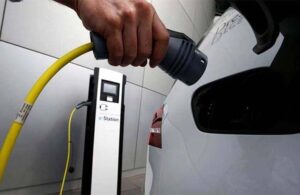Implementing its EV policy with full force, Chandigarh administration has declared that it will stop registering fuel-guzzling two-wheelers and auto-rickshaws after two years, and will only register electric vehicles (EV).
 The administration has notified the Chandigarh Electric Vehicles Policy, which will be applicable for the next five years, during which registration fees and road tax will not be levied on electric vehicles.
The administration has notified the Chandigarh Electric Vehicles Policy, which will be applicable for the next five years, during which registration fees and road tax will not be levied on electric vehicles.
Notably, vehicles on other fuels have to pay up to 8% registration fee and road tax in commercial vehicle category. The administration also said that EV owners charging at home will pay domestic rates, while those charging at pumps will be charged ₹8 per unit.
The EV policy aims to register 50% EV personal cars after four years, and a 100% in the segment of commercial passenger vehicles and buses.
To dissuade people from buying vehicles that run on conventional fuels that cause pollution, the administration has said that registration of these vehicles will be fixed for different categories, beyond which only electric vehicles will be registered.
“For instance, if we set a target to register 50% EV vehicles in the first year in some category, the registration of vehicles of other modes will be closed at fifty percent. After that only EV vehicles will be registered. The previous year will be the base year,” the official said.
While announcing the EV policy, UT adviser Dharam Pal said, “ Our target is to achieve the highest penetration of zero-emission vehicles among all Indian cities in five years. The policy will come into force from April 1.
The UT has also announced special incentives to early buyers, which include up to ₹2, 000 rebate on e-cycles, and up to ₹50,000 in other categories. The incentive will be provided directly to the owners of vehicles purchased and registered in UT. The cases will be processed offline for the time being.
Consumers will have to pay ₹8 per unit for slow or medium charging, ₹10 per unit for fast charging and ₹11 per unit for battery swapping at charging stations. “With these rates, a vehicle can run up to 200 km on a ₹300 charge with minor aberrations,” the official said.
Vehicle registrations have grown from 30,605 in 2020 to 38,247 in 2021. As per data from the Registering And Licence Authority and State Transport Authority of the city, there is an increase in both car sales and two-wheeler sales with car sales increasing from 14,208 in 2020 to 19,903 in 2021 and two-wheeler sales increasing from 14,984 in 2020 to 16,300 in 2021.
Electric vehicles sales almost doubled from 370 in 2020 to 733 in 2021.There are only 2,908 electric vehicles in the city.

